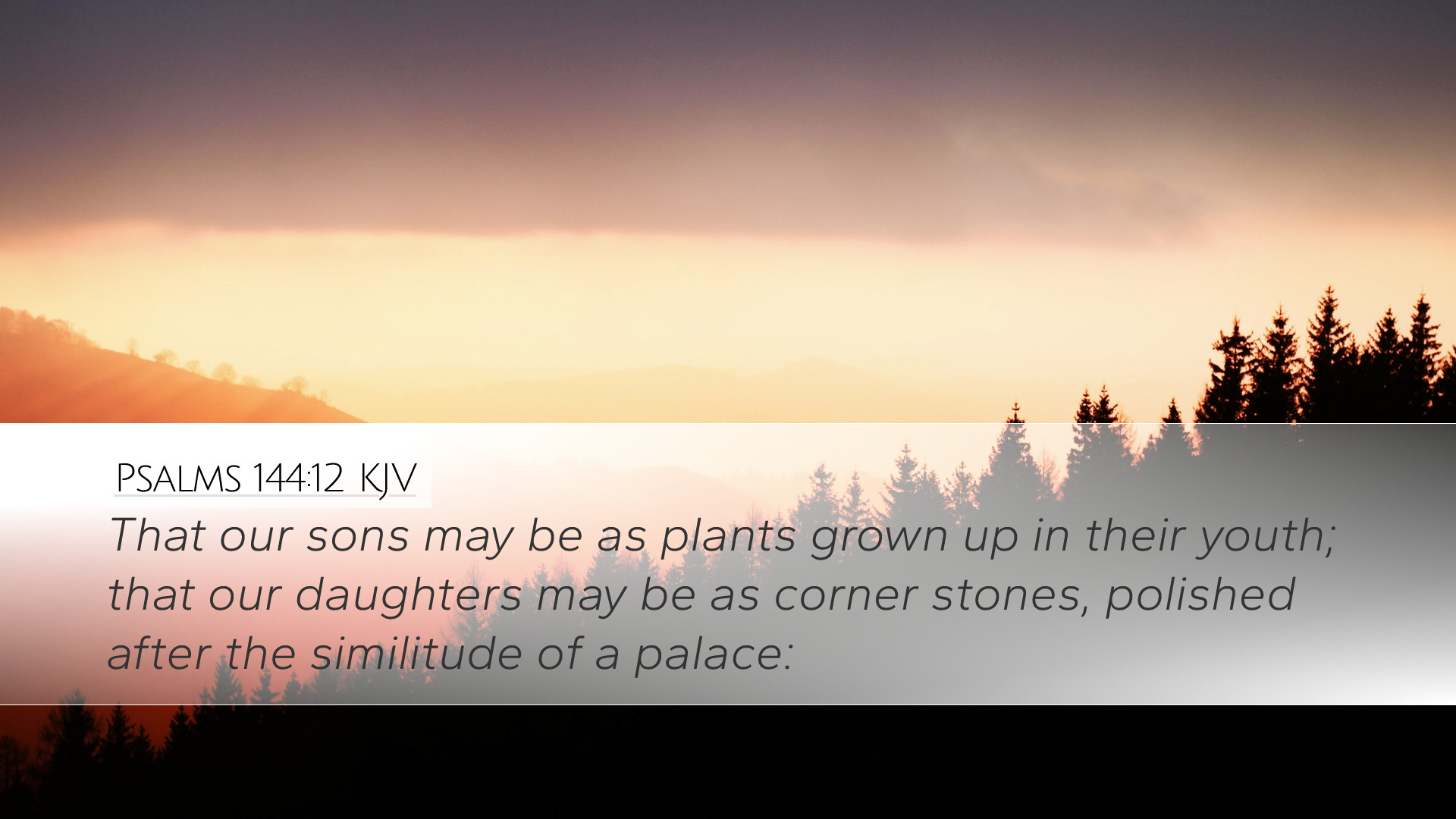Psalms 144:12 Commentary
Verse (KJV): "That our sons may be as plants grown up in their youth; that our daughters may be as corner stones, polished after the similitude of a palace."
Introduction
Psalms 144, attributed to David, reflects a prayer of praise and reliance on God amidst the challenges of life. Specifically, verse 12 expresses a desire for the prosperous growth of future generations. This desire embodies a deeper understanding of familial and societal excellence. Various public domain commentaries delve into the implications of this verse, offering insights that cater to pastors, students, theologians, and Bible scholars.
Insights from Matthew Henry
Matthew Henry emphasizes the metaphorical nature of the verse, understanding the sons as "plants" and daughters as "corner stones." He notes that:
- Growth and Stability: Sons are likened to plants indicating the hope for growth, vigor, and vitality. Young men are expected to grow into mature individuals, fruitful and strong.
- Daughters as Corner Stones: The daughters, described as corner stones, signify strength and beauty, essential for the stability of a household or community. Henry comments that these cornerstones should be "polished," suggesting a need for nurturing and preparation for future roles in life.
- Importance of Early Development: Both metaphors emphasize the importance of nurturing in early life stages, paralleling spiritual and moral upbringing for sustaining future generations.
Insights from Albert Barnes
Albert Barnes provides a complementary examination, focusing on the blessings and responsibilities associated with familial growth:
- Divine Blessings: Barnes identifies this plea as a request for God’s blessings on the offspring, emphasizing that growth must come from divine intervention.
- Moral and Spiritual Growth: The desire for sons to be like thriving plants includes both moral and spiritual dimensions. The implication is that such growth leads to productive individuals who will contribute positively to society.
- Significance of Daughters: When discussing daughters as polished corner stones, Barnes highlights their role in building a household. This reflects societal expectations in ancient cultures, where women were crucial in maintaining the legacy and honor of families.
Insights from Adam Clarke
Adam Clarke's take on this verse presents a more nuanced interpretation:
- Symbolism of Growth: Clarke suggests that "plants" and "corner stones" symbolize not merely physical growth but also intellectual and spiritual development.
- Comparative Analysis: He makes interesting comparisons between the expectancies of children today and those of biblical times, stressing that the core principles of nurturing remain unchanged.
- Cultural Implications: Clarke discusses the cultural significance of daughters as cornerstones, reinforcing that their development is as critical as that of sons in establishing a strong, cohesive family unit.
- Prayers for Future Generations: Clarke labels this verse as a prayer not just for individual growth but for systemic health within families and communities, reflecting the entirety of one’s societal attachments.
Theological Reflections
Combining insights from the commentaries, we can reflect theologically on several critical themes:
- God’s Sovereignty in Growth: The verse affirms that while human efforts are necessary in nurturing children, ultimate growth and development lie under God's sovereign will.
- Cultivating Character: The emphasis on being "polished" reflects the theological concept of sanctification, urging believers to pursue holiness in upbringing and personal development.
- Legacy and Its Impact: The verse sets a framework for the concept of legacy, where the growth of the next generation impacts the wider community, serving both as a witness and a testament to God’s faithfulness.
Application for Today’s Context
For pastors, students, and scholars, the practical applications of Psalms 144:12 can be significant:
- Family Ministry: This verse serves as a guiding principle in family ministry, indicating the importance of investing in the spiritual and moral growth of children.
- Discipleship: Emphasizing the 'plants' and 'corner stones' metaphor can redefine discipleship patterns within churches, focusing on nurturing individuals in their formative years.
- Community Building: Understanding these roles assists in community vision planning, shaping programs that enhance family stability, health, and spiritual growth.
Conclusion
Psalms 144:12 encapsulates a profound desire for the wholesome growth of future generations. The insights gathered from Matthew Henry, Albert Barnes, and Adam Clarke enrich our understanding of the familial structure and its significance from a biblical vantage point. As believers strive to ensure that their children grow as thriving plants and polished corner stones, the foundation of a godly legacy is laid, reflecting the overarching narrative of divine care and expectation throughout Scripture.


